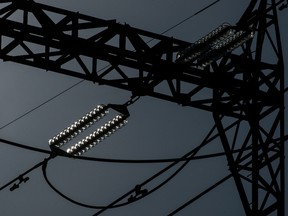Article content
OTTAWA – An executive at the U.S. company that recently purchased a controversial Ontario power-line project told MPs Thursday that his company is in talks about getting Canadian taxpayers to take a stake in the venture through the Canada Infrastructure Bank.
The Canada Infrastructure Bank (CIB) committed to a $655-million loan to the previous owners of the Lake Erie Connector. The loan never went through, because the previous owner of the project suspended and then sold it to NextEra Energy, but the bank did $900,000 worth of due diligence before that happened.
Article content
Matt Pawlowski, NextEra Energy’s vice-president, told MPs the company believes the CIB could be a good partner to help finance the project, but there are other options and things are only in the early stages.
“We actually have just re-engaged conversation with CIB and are looking forward to actually engaging with them on this project as a potential partner,” he told MPs at the House of Commons Transportation Committee.
Conservative MP Leslyn Lewis pressed Pawlowski on why taxpayers should have any role in financing a project from a company that is profitable today.
“Do you plan to take a low interest loan from the CIB, even though you’re a $120-billion company?”
Pawlowski said if the company does make an agreement with the CIB than it will be mutually beneficial. He said the CIB brings more than money to the table, including helping the project build partnerships with First Nations.
“We look at the involvement of the CIB in multiple ways. Financing is just one of the ways we look at it,” he said.
Article content
The project aims to build a high-voltage power line that would run under Lake Erie connecting Ontario to Pennsylvania and a broader power network covering 12 other states. The line would allow Ontario to sell power into the U.S. and to also bring power in from the U.S. during power shortages.
The line was originally proposed by a subsidiary of Canadian company Fortis, but the rights to develop it were sold to NextEra Energy, a U.S. firm that is the largest provider of wind and solar power in that country.
Lewis also asked about his company’s opposition to another power-line project that would bring Quebec Hydro Power into Maine. NextEra has opposed that project with legal challenges and through ballot measures.
Pawlowski said unlike the Maine project, the Lake Erie project will allow power to flow both ways benefiting both regions.
“The Maine project really relies on generation on one side going into the U.S. This Lake Erie connector project is very different,” he said.
MPs also heard testimony from Ontario’s Electric System Operator, which manage the province’s electric grid.
Article content
Chuck Farmer, a vice-president with the system operator, said they supported the project previously, but have to see new cost estimates to decide if they will support it again.
“We need to understand what the value of the line is to Ontario’s ratepayers which will tell us what we would be willing to pay for it and that would then be a negotiation that would take place,” he said.
Former Conservative cabinet minister Lisa Raitt also testified and told MPs she believes there is value in having the government work with private firms on infrastructure projects.
Former prime minister Stephen Harper set up P3 Canada when he was in office, a Crown corporation that partnered with private firms on infrastructure projects. Raitt said there is nothing wrong with private-public partnerships in principle, but the Liberal approach doesn’t offer the government enough control over bonuses and salaries.
“We dealt with major infrastructure projects in our government through the P3 Canada model, which is a Crown corporation, and within a Crown corporation any kind of bonusing actually goes through the prime minister, so it’s a really good way to ensure that you are accountable for the bonuses and that they’re kept to a certain level.”
National Post
rtumilty@postmedia.com
Get more deep-dive National Post political coverage and analysis in your inbox with the Political Hack newsletter, where Ottawa bureau chief Stuart Thomson and political analyst Tasha Kheiriddin get at what’s really going on behind the scenes on Parliament Hill every Wednesday and Friday, exclusively for subscribers. Sign up here.
Our website is the place for the latest breaking news, exclusive scoops, longreads and provocative commentary. Please bookmark nationalpost.com and sign up for our daily newsletter, Posted, here.
Share this article in your social network





)






